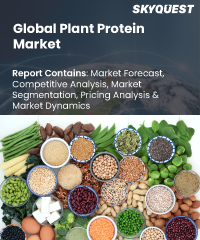
Report ID: SQMIG30I2289

Report ID:
SQMIG30I2289 |
Region:
Global |
Published Date: July, 2036
Pages:
265
|
Tables:
79 |
Figures:
75
Plant Protein Market size was valued at USD 9.6 billion in 2022 and is poised to grow from USD 10.11 billion in 2023 to USD 14.36 billion by 2031, growing at a CAGR of 5.5% in the forecast period (2024-2031).
Plant protein is simply a useful source of protein derived from plants. Pulses, tofu, soya, tempeh, seitan, nuts, seeds, some cereals, and even peas can be included in this category. Pulses are a broad category of plants that includes chickpeas, lentils, beans (including black, kidney, and adzuki beans), and split peas.
Plant-based proteins are regarded a more sustainable alternative to animal-sourced proteins in terms of both personal and environmental health. The considerable increase in demand for plant-based meals as a result of the rise in veganism and health concerns such as cardiovascular disease has led to the growth of this industry. Plant-based proteins are also gaining popularity among consumers due to the claimed health benefits of obesity control, which is also a global problem.
The covid pandemic and the rise in the vegan lifestyle are driving the demand for plant-based proteins. Plant-based proteins are healthier and contain less trans and saturated fats hence, the demand for various plant-based proteins is projected to increase over the forecast period. Major sources of plant-based protein are cereals in which corn holds the majority market followed by wheat and rice because these crops are easy to grow and are the most consumed agricultural crops across the world. Hence, corn, rice, and wheat is expected to hold the majority share. Apart from cereals, another trending category is legume-based proteins which are dominated by soybean, beans, and chickpeas.
US Plant Protein Market is poised to grow at a sustainable CAGR for the next forecast year.
Our industry expert will work with you to provide you with customized data in a short amount of time.
REQUEST FREE CUSTOMIZATIONWant to customize this report? This report can be personalized according to your needs. Our analysts and industry experts will work directly with you to understand your requirements and provide you with customized data in a short amount of time. We offer $1000 worth of FREE customization at the time of purchase.

Report ID: SQMIG30I2289